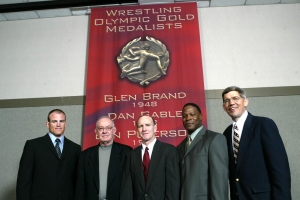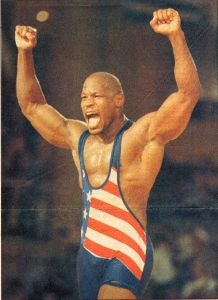Story written by Iowa State Athletics Communications student assistant Brad DePrez
The roller coaster tale of John E. duPont, Mark Schultz, Dave Schultz, and the most notorious wrestling club of its time, Foxcatcher, was brought to the big screen in Bennett Miller’s box office smash Foxcatcher. Boasting a cast of Hollywood superstars like Steve Carell, Mark Ruffalo and Channing Tatum, Foxcatcher made waves amongst wrestlers and non-wrestlers alike.
The story delves into the triumphs and tribulations faced by the Schultz brothers, John du Pont and all of Foxcatcher Wrestling. It also captures what is ultimately one of the greatest tragedies ever felt by the wrestling community.
To go along with the award-winning cast, three-time All-American and 2010 Iowa State national champion David Zabriskie makes an appearance in the film, playing a member of team Foxcatcher.
This film, which was nominated for five Academy Awards, has even deeper ties to the Cyclone wrestling program than Zabriskie’s big-screen debut. From 1990-1995, Iowa State head coach Kevin Jackson competed for Foxcatcher.
In 1990, one of the greatest freestyle wrestlers in the history of the sport, Dave Schultz, approached Jackson and convinced the 1987 NCAA runner-up national champion to join the hottest team in international wrestling.
“Dave Schultz was probably the biggest draw (to Foxcatcher),” said Jackson. “It was also a club that could fund you in a way so that you didn’t have to worry about providing for your wife, family and kids. You could just focus on being an athlete.”
Jackson joined the squad of 30 senior-level athletes at the Foxcatcher Farm in Pennsylvania. He did not live on the farm full time, though. He continued to train and serve as an assistant coach for the Iowa State wrestling team during this time.
When Jackson did venture out to Pennsylvania to train, he was hosted by du Pont, a wrestling enthusiast, philanthropist and ultimately team Foxcatcher’s financial crutch. The Foxcatcher Farm was located on the du Pont family’s land, and this is where the top wrestlers from around the United States came to train.

Iowa State’s five Olympic Gold medalists (l to r: Cael Sanderson, Glen Brand, Dan Gable, Kevin Jackson, Ben Peterson) reunite in 2007. Jake Varner joined the elite club in 2012.
“I stayed at the big house, du Pont’s house,” Jackson said. “It was the perfect training situation for me. I’d go out there and not have to worry about anything. Every night we’d have a sit down dinner. He’d ring the bell and his maids would bring in the next course. No distractions. I didn’t have to worry about food, and I had great training partners.”
Jackson ate almost every dinner with du Pont while he trained on the farm, and held numerous conversations with the philanthropist. It was not difficult at all for Jackson, or any of the other wrestlers on the Farm, to inquire that there was something different about du Pont.
“He came from a different world than blue collar wrestlers come from,” Jackson said. “We recognized that he was different. He was a paranoid schizophrenic. I think the drugs and alcohol exaggerated it as well.”
Jackson recalls several conversations that he had with du Pont about odd aberrations that he would see on the farm. This was not an extraordinary encounter to have for those that regularly interacted with du Pont.
“He would talk about how his father worked for Disney,” Jackson said. “He said that there were a bunch of illusions on the farm, and that when it rained you could see the characters.”
These illusions and aberrations became so enflamed that du Pont believed that there were tunnels in and under his house, and that people were spying on him.
“He had wrestlers climb in between the walls to see if they could fit in there,” Jackson said. “He really believed people were spying on him. What really tipped the scales is when he started caring the gun around.”
Although Jackson describes his time on Team Foxcatcher as civil and pleasant, his dismissal from the team was not. Along with the rest of the black athletes training at Foxcatcher, Jackson received the boot from duPont’s world-renowned wrestling program in 1995. Jackson said that duPont’s heightened paranoia and schizophrenia were to blame for his ultimate demise with the Foxcatcher program.
Foxcatcher focuses mainly on the competition years from 1984-88, while Mark Schultz was in the prime of his wrestling career. Jackson narrowly missed scrapping with the 1984 gold medalist, as he was just starting his senior-level career, joining the circuit in 1987.
Although they never competed with each other, Jackson says that he had first hand experience of what Mark was capable of doing on the mat.
“When I was a younger collegiate athlete, I’d go to training camps and (Mark) would be there and he’d beat up on me,” Jackson said. “Even though we’re not that far apart in age, he still probably could have competed in my era.”
Dave Schultz and Jackson had a much different relationship, and it was one that radiated both on and off the mat. The two elite wrestlers were training partners, best friends and as Jackson put it, “brothers.”
“With Dave, it was always a good time,” Jackson said. “We worked real hard, but we were always laughing or smiling about something.”
Dave Schultz’s love and passion for the sport of wrestling was something that Jackson truly admired. His efforts to coach and better his teammates and training partners were far-reaching, especially in Jackson’s development as an elite wrestler on the world stage.
“He was one of the few guys that could devise and develop his own technique, and it would work,” Jackson said. “He was a genius in that respect. If it weren’t for Dave, I never would have developed my par terre defense. He was instrumental in my development.”
In 1996, du Pont would tragically shoot and kill Dave Schultz on the property of Foxcatcher Farm.
“I’ll never forget it,” Jackson said. “Melvin Douglas called me up, and he said, ‘du Pont did it. du Pont shot Dave.’ Right away, I knew that it was true, and it hit me like a ton of bricks.”
This was the one scene in the film that particularly struck Jackson. It was also a bit of déjà vu for him, as he had already experienced this scene through a phone call that he had with Nancy Schultz, Dave’s widowed wife, shortly after Dave’s death.
“That was the most troubling part of the movie for me, because I knew how it happened,” Jackson said. “When I called (Nancy) after Dave’s death, that’s exactly what she told me. She said that du Pont shot him from the car, there was a security guard outside of the car and then Nancy came out of the house and he pointed the gun at her.”
Dave Schultz’s funeral served as a memorial for all of the wrestling community to take part in, and it was one that Jackson described as a surreal experience.
“Every time you’re at a big time wrestling event, and there’s all the people associated with our sport, Dave’s always there,” Jackson said. “It felt like Dave was going to pop up at any time.”
Around the time of his death, USA Wrestling was working on getting Schultz off the Foxcatcher farm, and bringing him on full time as the first USA Wrestling freestyle head coach. Before the plans were finalized, however, du Pont shot and murdered him. Two years later, Kevin Jackson was named USA Wrestling’s first freestyle head coach.
“That job was created for Dave Schultz,” Jackson said. “The plan was to get Dave out of Foxcatcher, and get him to USA Wrestling at Colorado Springs to do kind of the same stuff that he was already doing. It was already in the works. It was going to happen.”
The sport of wrestling and the USA national team lost so much when they lost Schultz. He was one of the greatest minds to ever compete or coach the sport. Jackson says that they lost all of that, on top of Schultz’s passion and love for wrestling that was matched by none other.
“This hit the whole world, not just the United States,” Jackson said. “From a technical standpoint, we lost everything. We lost our best technician. For him, wrestling was fun it was creative. It wasn’t the grind that these kids make it out to be. It was something that we loved to do and that he loved to do.”


Pingback: The Mid-Morning Dump – 5/26/15 | SoonerSource.com
Very nice
LikeLike